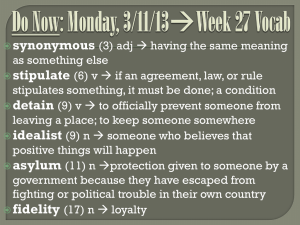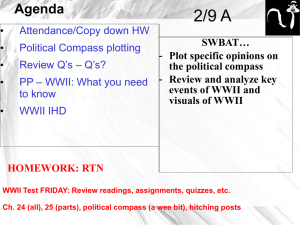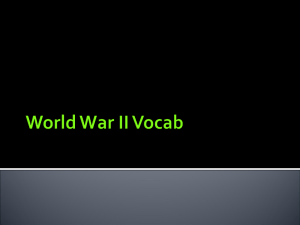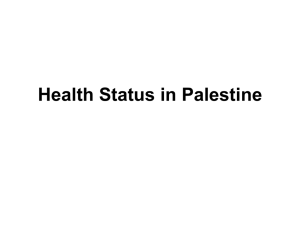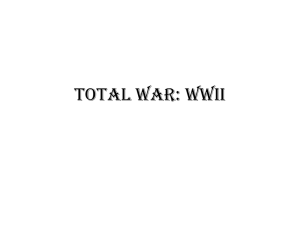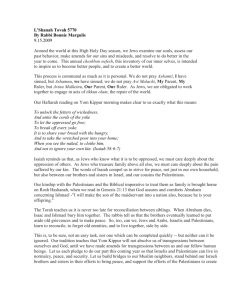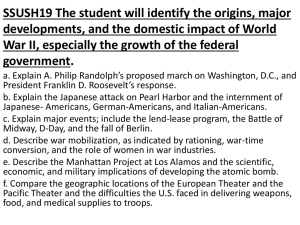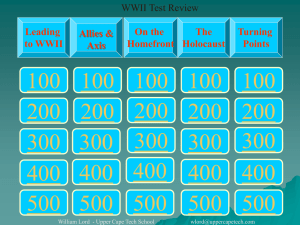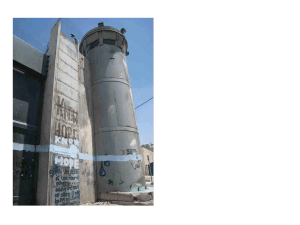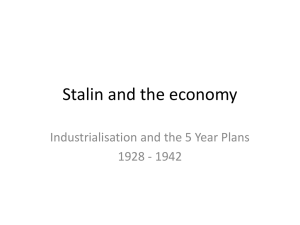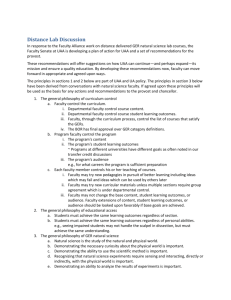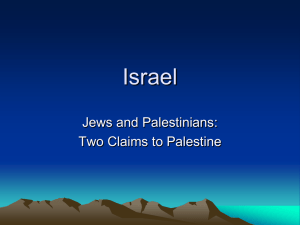File - Mr. Coleman History
advertisement
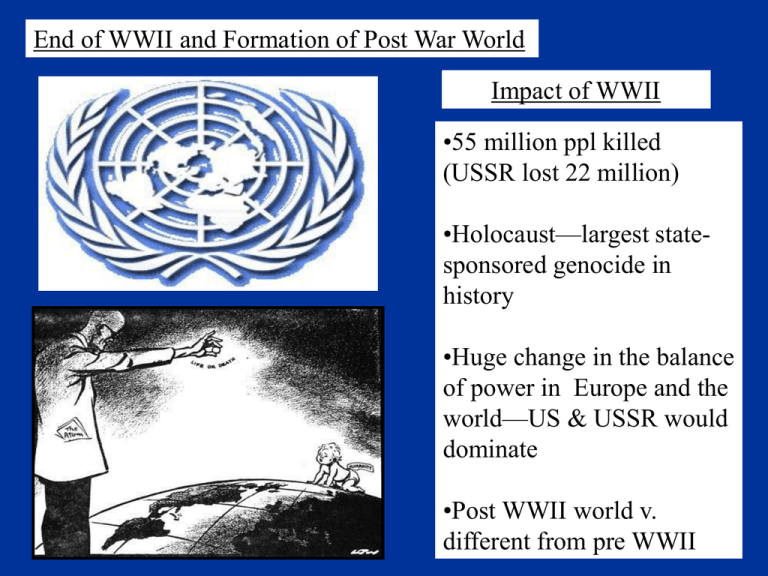
End of WWII and Formation of Post War World Impact of WWII •55 million ppl killed (USSR lost 22 million) •Holocaust—largest statesponsored genocide in history •Huge change in the balance of power in Europe and the world—US & USSR would dominate •Post WWII world v. different from pre WWII Formation of United Nations •April 1945—50 nations met in San Francisco to plan for a body that would help to govern the post war world •Wanted to solve issues that led to WWI & WWII before they turned into World War III UN Mission •Maintain World Peace & Security •Foster Economic & Social Development •Protect Human Rights •Be place for nations to work out differences The “Superpowers” at the UN •UN’s most powerful group is The Security Council • 5 original & permanent members are US, USSR, GB, Fr & China have veto power meaning if all don’t agree w/ something, then it does not pass (does not become a “binding resolution”) •Post WWII—US & USSR are “superpowers” at UN Immediate Problems after WWII Occupation/De-militarization of Japan: •US took control of Japan through military occupation •Helped rebuild cities etc.—not v. harsh •Japanese people were very compliant w/ US once they realized US troops were not the “animals” their gov’t said they were Division and occupation of Germany: •Ger divided into 4 zones which were occupied by Allied troops US, GB, FR =W. Ger; USSR = E. Ger. •Berlin (capital) was also in 4 zones w/in in Soviet zone •Germans did not want to be under Soviet control— v. harsh & communist •USSR also controlled all land east of Ger. (captured from Ger) Dealing w/ Destruction of Europe: • • • Major cities—esp in Ger— were flattened Major industry destroyed 12 million homeless hardship of the war lasted for years Dealing with Displaced Persons (Non-Jews): •Summer 1945 there were 20 million people in Europe were on the move --trying to get home --escaping Soviet control --running from Allies Liberation of Camps: •World was shocked by death camps & felt guilt for not helping more •Survivors were moved to DP (displaced persons) camps —cared for by Allies •Most lost everything and either wouldn’t or couldn’t return go home b/c: --their communities were shattered, families were gone, houses occupied by non-Jews or destroyed (also making it too traumatic to return home) --homes were in E. Europe—occupied by USSR (no one wanted to live under Stalin) --wanted to begin fresh in a different place •Most Jews wanted to leave Europe altogether and emigrate to Palestine WHY PALESTINE? Nuremberg Trials: • Held from Nov 1945—Sep 1946 •Nazi leaders put on trial in by an international court (but trials held in Ger) •Most found guilty—many executed for “crimes against humanity” •Only a very small percentage of Nazis stood trial though—most escaped justice by emigrating to other nations or assuming new identities within Germany. Issues in British Mandate post WWII: •Brits didn’t want to upset Palestinians by allowing millions of Jews to emigrate •Jews got tired of waiting to live in what they considered to be “their homeland” —wanted a nation where they were the majority & therefore safe from persecution •1945—1948 approx. 70,000 illegally entered Palestine causing major tension w/ Arabs in region. Mostly traveled across the Med. Sea by ship — sometimes GB sent them back to Europe causing an international fury Partition of Palestine & Creation of Israel : •GB asked UN to solve issue between Jews & Palestinians •1947—UN passed a resolution calling for partition of Palestine— split between Jews & Palestinians •Jews said yes, but Palestinians said no (Arabs did not think it was fair) •GB refused to enforce partition b/c Palestinians did not agree— gave control of area to UN in 1948 •May 14, 1948 Israel declared their part a “formal” nation—Arab neighbors declare war to support Palestinians beginning the 1st Arab-Israeli War
